
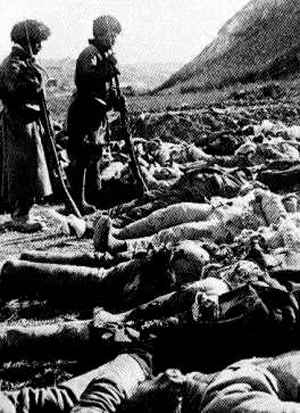
1905 Russo-Japanese War: The Battle of Mukden ends with Mukden's occupation. [See: Countdown to Infamy: Timeline to Pearl Harbor.]
1915 Various:
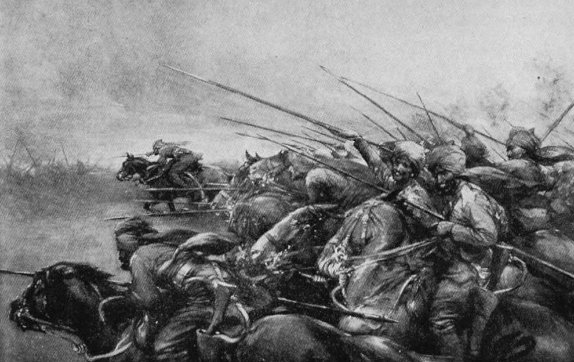
World War I: At 7:30 am, a concentrated 35-minute artillery bombardment of 342 guns across a 2,000 yard line begins—what will become known as—the Battle of Neuve Chapelle. Douglas Haig's First Army leads the attack, with four divisions of 40,000 men being committed along a 3 km front.

World War I: Gefreiter Adolf Hitler's List Regiment arrives at Tourcoing at dawn, and most of the men lay down for some promised rest. Infanterist recruit Balthaser Brandmayer writes that alarms were sounded at noon "from all directions . . . . An hour later we find ourselves sitting in a military train, where this would take us no one knows. Some suspect that we will be going to Russia, others to Lorraine . . . . The overloaded train rolls slowly and carefully into the deepening night. We freeze: scarcely a word is spoken." Having disembarked in Lille, where "English [Sic] regiments have broken through the German front line", the regiment is marched off to its destination: Neuve Chapelle. The British had broken through the German lines.
From the Bavarian official history:In order to recapture the lost territory, the 2th BRD, which had just been withdrawn from its position by Messines, was driven up to support the VII Corps. The division entered battle not in collective bodies. Regiments, battalions, detachments, companies, and batteries were thrown into the battlefield, as soon as they arrived at the railway station, and they were divided up among the Prussian troops' formations. A motley crew was the consequence.
Hans Mend:
The confusion came into being because the different formations from our regiment, as they disembarked from their trains, were immediately marched to the Front and had gone into action, on their own account, between Prussian troops. The battle orderlies, Hitler, Lippert, Schmidt, and Weiss had the task, in so far as possible, to re-establish the connection, which was made all the more difficult by the frightful fire and the soggy ground underfoot. Hitler said later in Fournes that he had to deliver reports by creeping forward from one shell-hole to another, and that sometimes the sulfur fumes only allowed him to see 10 metres to the Front . . . . [While waiting, Hitler paced] around like a restless tiger in the farm at Halpegarde . . . . Even the Colonel said: "I can scarcely believe that my orderlies can come through this fire".
From an account of the battle by Count Charles de Souza:The Germans were surprised, outnumbered, outflanked on both sides, and, after a stubborn struggle, they were ousted from the position. The victory was complete, and would have been more satisfactory had it been less costly. The British casualties exceeded 12,000 out of 50,000 men engaged on that occasion. This was due to the impetuosity of the new troops and of some officers who misunderstood the object of the attack.
1917 World War I: Turkish troops begin evacuation of Baghdad:
Less than two weeks after their victorious recapture of the strategically placed city of Kut-al-Amara on the Tigris River in Mesopotamia, British troops under the regional command of Sir Frederick Stanley Maude bear down on Baghdad, causing their Turkish opponents to begin a full-scale evacuation of the city on the evening of March 10, 1917 . . . .
In the wake of their success at Kut, Maude's forces paused briefly while waiting for confirmation from headquarters in London to continue their offensive. Operations were not renewed until March 5: a pause that gave Turkish commander in chief Khalil Pasha some time to consider his options for mounting a defense of Baghdad, the capital of the Ottoman Empire's southern region. In the end, Pasha was indecisive: after first beginning preparations for an offensively minded forward assault on approaching Allied forces, he decided instead to fall back and concentrate his troops near Baghdad itself. He therefore stationed the Turkish Sixth Army some 35 miles to the south of the city, near the junction of the Tigris with the Diyala River.
In the absence of significant reserves, the Turks were vastly outnumbered, with only 9,500 soldiers facing 45,000 British and Indian troops. Maude's troops reached the Diyala on March 8, mounting their first assault on the Turkish positions the next morning, which Pasha and his men successfully repelled. After struggling to cross the fast-moving Diyala, Maude decided to shift his troops and cross the river at a more northern point. Alerted to enemy movements by German reconnaissance aircraft, Pasha mirrored his movements, sending the bulk of his forces to meet the Allied soldiers. He left a single regiment to hold the original defensive position at the Diyala, which was quickly and decisively crushed by British and Indian forces with a sudden attack on March 10. Stunned, Pasha ordered his troops to retreat. By the end of the day, the evacuation of Baghdad was underway.
After marching more than 100 miles in 15 days, Maude's troops entered Baghdad on March 11 without a struggle, taking 9,000 prisoners from the retreating Ottoman army amid cheers from the city's 140,000 occupants. The Allied victory in Baghdad marked only the beginning of the struggle over who would control the oil-rich region of Mesopotamia. [For further details, Click here]
1920 Death: Karl Lueger: Former mayor of Vienna: Hitler sang his praises in Mein Kampf:
Although not a racist, Lueger believed that Vienna was 'built by German strength and courage' and should remain German in sprit forever. He regarded German nationalism with skepticism, but since he believed that accomplishments were more important than ideology, he was not above using the continuous anti-Semitic and anti-Slav currents in Vienna for his own purposes. Although Lueger had a Jewish ancestor in his family tree, he joined the anti-Semitic forces, though slowly and with qualifications. His party's program acknowledged a 'Jewish problem,' but only in the sense that the Jews, in their desire to make profits, were merely following the liberal way of life. 'Eliminate the poison' of complete economic freedom, he believed, and the 'Jewish problem' would go away.
1922 Weimar: The Bavarian government seriously considers deporting Adolf Hitler, an Austrian national, but decides against the move. (Maser)
1931 Weimar: Membership in the Nazi party is ruled impermissible by the three bishops of Paderborn province. (THP) [See: Was Adolf Hitler a Christian?]
1933 Various:
From an affidavit by American Herman I. Roseman:
Yesterday, March 10th, 1933, in the afternoon about 4:30, I came out of KDW with my fiancee, Fraulein Else Schwarzlose, residing in Wilmersdorf (giving the address). A man in SA uniform stepped on my toe purposely, obviously offended me, and said "Pardon." I said "Bitte," and walked ahead. He then followed me and kicked me saying, "Na und?" A policeman saw this and walked ahead, paying no attention to attacks made on me. Then I took my passport out of my pocket, showed it to the second policeman, and said that I was an American citizen, but he walked ahead, obviously not able to afford me protection, or at least being unwilling. The SA man continued to attack me, struck me in the face, wounded me over the eye, and continued to do me bodily harm. During this attack, all the time my walking along, we reached another policeman, and I applied to him, showing my passport and said, "I am an American and am entitled to protection." He shrugged his shoulders and said, "What can I do?" By this time the SA man had obviously inflicted enough attack upon me and walked away.
Upon my appeal, the policeman brought my fiancee and me to the station house at 13 Bayreutherstrasse. My fiancee and I reported to the officer in charge. He heard the story and said that he was sorry, but that there was nothing to do. My face was bleeding. The policeman said that he had orders not to interfere in any affair in which an SA man took part. I then asked him what I could do to protect myself. He said that there was nothing to do but to wait until the situation was better. He added that the police were absolutely powerless, and were under the direction of the SA, and that there were SA Sturmabteilungen in the police itself. Thereupon I departed.
From another American, Mrs. Jean Klauber:
On the night of Friday, March 10, 1933, she and her husband had retired for the night when they were awakened by a prolonged ringing of their apartment bell. They heard pounding upon the street door and a demand for immediate entry and a concurrent threat to break the door down. The street door was opened by the janitor's wife; and a party of four or five men entered and went at once to the apartment of the deponent, where they again rang and pounded on the door. Mr. Klauber asked who was there and was answered, 'The police.' He opened the door and a party of four or five men in brown uniforms, one wearing a dark overcoat and carrying a rifle, pushed in, jostling Mr. and Mrs. Klauber aside. One asked Mrs. Klauber where the telephone was and she indicated the room where it was to be found and started to go there. Thereupon, she was knocked down by one of them. They went on to the bedroom where Mr. and Mrs. Klauber followed them, and there they demanded their passports. Mr. Klauber went to the wardrobe to get his and was stopped, being asked by the intruders whether he was carrying any weapons. Being clothed only in pajamas, his denial was accompanied by a gesture indicating his garb. He then turned to the wardrobe, opened it, and reached for one of his four suits hanging therein where he thought the passport was, and was immediately attacked from behind by all but one of the intruders, who beat him severely with police clubs, the one with the overcoat and rifle standing by. Remarks were shouted such as, 'look! Four suits, while for 14 years we have been starving!' Mrs. Klauber tried to inquire the reason for their actions, and was answered, 'Jews. We hate you. For 14 years we have been waiting for this, and tonight we will hang many of you.'
'When the intruders stopped beating Mr. Klauber he was unconscious, and they again demanded the passports of Mrs. Klauber. Mrs. Klauber found her American passport and her German passport (required by local authorities as the wife of a German citizen and issued by the police at Munich after her arrival here); and the intruders took both in spite of Mrs. Klauber's protests that she was American. She then searched for her husband's passport, laid hold of his pocketbook, and in her excitement offered it to them. Though full of money they refused it, and again demanded the passport. Mrs. Klauber then found it and handed it over. Then the intruders returned to the unconscious Mr. Klauber, saying, 'He hasn't had enough yet,' and beat him further. Then they left, saying, 'We are not yet finished,' and just as they departed, one of them said to Mrs. Klauber, 'Why did you marry a Jew? I hate them,' and struck her on the jaw with his police club.
1938 Various:
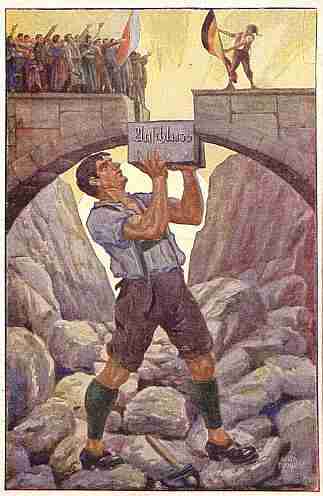
By surprise and without consulting his ministers Schuschnigg ordered a plebiscite for Sunday, 13 March, which should bring a strong majority for the Legitimists in the absence of plan or preparation. Fuehrer is determined not to tolerate it. The same night, March 9 to 10, he calls for Herman Goering. General Von Reichenau is called back from Cairo Olympic Committee, General Von Schober is ordered to come, as well as Minister Glaise Horstenau, who is with Gauleiter Burckel in the Palatinate. General Keitel communicates the facts at 1:45. He drives to the Reichskanzlei at 10 o'clock. I follow at 10:15, according to the wish of General v. Viebahn, to give him the old draft. Prepare case Otto.
1300 hours: General K informs Chief of Operational Staff (and) Admiral Canaris. Ribbentrop is being detained in London. Neurath takes over the Foreign Office. Fuehrer wants to transmit ultimatum to the Austrian Cabinet. A personal letter is dispatched to Mussolini and the reasons are developed which force the Fuehrer to take action. 1830 hours: Mobilization order is given to the Command of the 8th Army (Corps Area 3) 7th and 13th Army Corps; without reserve Army.
[For further details, Click here]
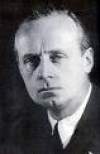
Anschluss: Ribbentrop meets with Halifax at the Foreign Office. Halifax expresses the Brirish Government's profound desire for an understanding with Germany on a basis of compromise. Halifax delivers a carefully worded statement:
[The British Government understands Germany's point of view on Austria and Czechoslovakia, and has] no desire to place obstacles in the way of peaceful agreement reached by peaceful means . . . . But we should be less than frank if we did not make it clear to the German Government the danger we saw in the expression that responsible leaders in Germany were giving in public to German policy and to the spirit in which that policy was being pursued. The suggestion was being created that something more than fair treatment of minorities was involved. This seemed to us . . . to hold very dangerous possibilities in Europe . . . . [If] once war should start in Central Europe, it was quite impossible to say where it might not end, or who might not become involved . . . . I attached the utmost importance to everything being done to ensure that the [Austrian] plebiscite was carried out without interference or intimidation.
From Ribbentrop, A Biography by Michael Bloch:
Following this talk [above], Ribbentrop sent Spitzy [Reinhard Spitzy, Ribbentrop's private secretary] back to Berlin with a letter for Hitler, answering the two questions which had been put to him. First, how sincere was Chamberlain in his professed desire for understanding with Germany? Echoing his report of 2 January, Ribbentrop replied sceptically that 'England's primary aim continues to be to gain time to complete her armament': she wanted to settle with Germany on her own terms without sacrificing her own interests, and would break up the Axis if she could. Secondly, what would England do 'if the Austrian question cannot be settled peacefully'? Ribbentrop declared himself 'convinced that England of her own accord will do nothing in regard to it at present, and that she would exert a moderating influence on the other powers'. He failed to mention Halifax's 'warning' on the risk of war if Germany persisted in an aggressive policy. This, however, had been anticipated by Halifax, who sent a copy of his remarks to Henderson [British Ambassador in Berlin] for communication to Neurath.
It was galling for Ribbentrop to be absent from Berlin at such a moment, but there was nothing for him to do but proceed with the formal business which had brought him to London. That evening, he held a great farewell reception at the German Embassy, to which he had invited virtually everyone he knew in England, including the entire British Government and all the foreign representatives in the capital. One member of the British Foreign Office arrived to find him 'walking up and down with the Austrian Minister in the most affectionate manner, which I thought especially repelent as Ribbentrop, like myself, knew that the German army stood poised to invade Austria, while the Austrian was blissfully unaware of this possibility.
1939 Czecho-Slovakia: Hitler orders the German army to enter Prague, and from Prague Castle proclaims a protectorate.
1940 Various:
Holocaust: From the Warsaw Ghetto Diary of Chaim A. Kaplan:
It is our good fortune that the conquerors failed to understand the nature and strength of Polish Jewry. Logically, we are obliged to die. According to the laws of nature, our end is destruction and total annihilation. How can an entire community feed itself when it has no grip on life? For there is no occupation, no trade which is not limited and circumscribed for us. But even this time we did not comply with the laws of nature. There is within us some hidden power, mysterious and secret, which keeps us going, keeps us alive.
World War II: Sumner Welles makes a "peace proposal":
On this day, U.S. Undersecretary of State Sumner Welles, after a meeting with Adolf Hitler in Berlin, visits London to discuss a peacemaking proposal with Prime Minister Neville Chamberlain to prevent a widening of the European war.
Sumner Welles, a diplomat and expert on Latin America, spent his early professional life promoting the United States' "Good Neighbor" foreign policy as attache to the U.S. embassy in Buenos Aires, chief of Latin American affairs of the State Department, and commissioner to the Dominican Republic. In 1933, President Franklin D. Roosevelt appointed him assistant secretary of state, sending him to Cuba, where Welles successfully mediated opposing groups attempting to overthrow the government of Gerardo Machado. He was promoted to undersecretary of state in 1937, serving as a delegate to several Pan-American conferences.
But in 1940, the stakes were raised for Welles. War had broken out in Europe with the German invasion of Poland, and Welles was sent on a fact-finding tour of Berlin, Rome, Paris, and London, in the hopes of keeping the war contained, at the very least, and ideally brought to an end. After a trip to Rome to chat with Benito Mussolini, Welles met with Hitler on March 1-3. Hitler feared that Welles would try to drive a wedge between himself and Axis partner Italy by convincing Mussolini to keep out of the conflict completely. As a result, the Fuhrer bombarded Welles with a propagandistic interpretation of recent events, putting the blame for the European conflict on England and France. Welles informed Hitler that he and Mussolini had engaged in a "long, constructive, and helpful" conversation, and that the Duce believed "there was still a possibility of bringing about a firm and lasting peace." Hitler agreed that there would be peace-after a German victory in Europe.
Welles left Berlin and arrived in London on March 10. He briefed British Prime Minister Neville Chamberlain on Hitler's intransigence, arguing that the only hope for a lasting peace was the progressive disarmament of the belligerents, primarily Germany. Chamberlain's foreign ministers were less than impressed with the suggestion, believing that even a "disarmed" Germany could still invade a smaller, weaker nation. In short, Welles' trip accomplished nothing. (History.com)
1943 Various:
Holocaust: The SS demands the deportation of all 49,000 Bulgarian Jews to Poland. The Bulgarian people, the King, the Parliament, the intellectuals and even the farmers, were said to be ready to lie down on the railway tracks to prevent the deportations. (THP)
World War II: Because forced recruitment is swelling the ranks of the partisans and making the Army's task more difficult, German field commanders on the Eastern Front attempt to resist or restrain Sauckel's demands. In response, Fritz Sauckel sends this telegram to Hitler; an excerpt:
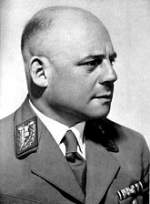
Therefore, my Fuehrer, I ask you to abolish all orders which oppose the obligation of foreign workers for labor and kindly to report to me whether my conception of the mission presented here is all right . . . . If the obligation for labor and the forced recruiting of workers in the East is not possible any more, then the German war industries and agriculture cannot fulfill their tasks to the full extent . . . . I myself have the opinion that our Army leaders should not give credence, under any circumstances, to the atrocity and defamatory propaganda campaign of the partisans. The generals themselves are greatly interested that the support for the troops is made possible in time. I should like to point out that hundreds of thousands of excellent workers going into the field as soldiers now cannot possibly be replaced by German women not used to work, even if they are trying to do their best. Therefore, I have to use the people of the Eastern Territories. I myself report to you that the workers belonging to all foreign nations are treated humanely, and correctly, and cleanly; are fed and housed well and are even clothed. On the basis of my own services with foreign nations I go as far as to state that never before in the world were foreign workers treated as correctly as they are now, in the hardest of all wars, by the German people."
1945 World War II: Various:
Churchill to FDR: "The Lublin Poles may well answer that their Government can alone ensure . . . the maximum amount of political tranquility inside . . . that they already represent the great mass of . . . democratic forces in Poland, . . . and that they cannot join hands with emigre traitors to Poland or Fascist collaborators and landlords, and so on, according to the usual technique. Meanwhile we shall not be allowed inside the country or have any means of informing ourselves upon the position. It suits the Soviets very well to have a long period of delay, so that the process of liquidation of elements unfavorable to them or their puppets may run its full course. [See: The Last Days of the Third Reich.]
The Firebombing of Tokyo continues:
On March 10, 1945, 300 American bombers continue to drop almost 2,000 tons of incendiaries on Tokyo, Japan, in a mission that had begun the previous day. The attack destroyed large portions of the Japanese capital and killed 100,000 civilians.
In the closing months of the war, the United States had turned to incendiary bombing tactics against Japan, also known as "area bombing," in an attempt to break Japanese morale and force a surrender. The firebombing of Tokyo was the first major bombing operation of this sort against Japan.
Early in the morning, the B-29s dropped their bombs of napalm and magnesium incendiaries over the packed residential districts along the Sumida River in eastern Tokyo. The conflagration quickly engulfed Tokyo's wooden residential structures, and the subsequent firestorm replaced oxygen with lethal gases, superheated the atmosphere, and caused hurricane-like winds that blew a wall of fire across the city. The majority of the 100,000 who perished died from carbon monoxide poisoning and the sudden lack of oxygen, but others died horrible deaths within the firestorm, such as those who attempted to find protection in the Sumida River and were boiled alive, or those who were trampled to death in the rush to escape the burning city. As a result of the attack, 10 square miles of eastern Tokyo were entirely obliterated, and an estimated 250,000 buildings were destroyed.
During the next nine days, U.S. bombers flew similar missions against Nagoya, Osaka, and Kobe. In August, U.S. atomic attacks against Hiroshima and Nagasaki finally forced Japan's hand. (History.com)
1948 Cold War: Strange death of Jan Masaryk:
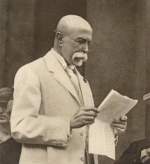
The communist-controlled government of Czechoslovakia reports that Foreign Minister Jan Masaryk has committed suicide. The story of the noncommunist Masaryk's death was greeted with skepticism in the West.
Masaryk was born in 1886, the son of Czechoslovakia's first president. After World War I, he served as foreign minister in the new Czech government. Later he served as the Czech ambassador to Great Britain. During World War II, he once again took the position of foreign minister, this time with the Czech government-in-exile in London. After the war, Masaryk returned to Czechoslovakia to serve as foreign minister under President Eduard Benes. It was a tense time in Masaryk's native country. The Soviet Union had occupied the nation during World War II and there were fears that the Soviets would try to install a communist government in Czechoslovakia, as it had in Poland, East Germany, and elsewhere in Eastern Europe. Masaryk, however, was skillful in dealing with the Soviets, assuring them that a democratic Czechoslovakia posed no security threat to Russia.
In 1947, though, Masaryk made a fatal mistake. When the United States unveiled the Marshall Plan‑-the multimillion-dollar aid program for postwar Europe‑-Masaryk indicated Czechoslovakia's interest in participating. When he informed the Soviets, they absolutely refused to give their approval. This was quickly followed, in February 1948, by a communist coup in Czechoslovakia. President Benes was forced to accept a communist-dominated government. Masaryk was one of the few non-communists left in place. On March 10, 1948, the Czech government reported that Masaryk had committed suicide by jumping out of a third-story window at the Foreign Ministry.
The reaction in the West was characterized by deep suspicion. Secretary of State George Marshall stated that Czechoslovakia was under a "reign of terror," and that Masaryk's "suicide" indicated "very plainly what is going on." Despite suspicions that the communists had murdered Masaryk, nothing has been proven definitively and his death remains one of the great mysteries of the Cold War era. (History.com)
1959 Rebellion in Tibet:
Tibetans band together in revolt, surrounding the summer palace of the Dalai Lama in defiance of Chinese occupation forces.
China's occupation of Tibet began nearly a decade before, in October 1950, when troops from its People's Liberation Army (PLA) invaded the country, barely one year after the Communists gained full control of mainland China. The Tibetan government gave into Chinese pressure the following year, signing a treaty that ensured the power of His Holiness the Dalai Lama, the country's spiritual leader, over Tibet's domestic affairs. Resistance to the Chinese occupation built steadily over the next several years, including a revolt in several areas of eastern Tibet in 1956. By December 1958, rebellion was simmering in Lhasa, the capital, and the PLA command threatened to bomb the city if order was not maintained.
The March 1959 uprising in Lhasa was triggered by fears of a plot to kidnap the Dalai Lama and take him to Beijing. When Chinese military officers invited His Holiness to visit the PLA headquarters for a theatrical performance and official tea, he was told he must come alone, and that no Tibetan military bodyguards or personnel would be allowed past the edges of the military camp. On March 10, 300,000 loyal Tibetans surrounded Norbulinka Palace, preventing the Dalai Lama from accepting the PLA's invitation. By March 17, Chinese artillery was aimed at the palace, and the Dalai Lama was evacuated to neighboring India. Fighting broke out in Lhasa two days later, with Tibetan rebels hopelessly outnumbered and outgunned. Early on March 21, the Chinese began shelling Norbulinka, slaughtering tens of thousands of men, women and children still camped outside. In the aftermath, the PLA cracked down on Tibetan resistance, executing the Dalai Lama's guards and destroying Lhasa's major monasteries along with thousands of their inhabitants.
China's stranglehold on Tibet and its brutal suppression of separatist activity has continued in the decades following the unsuccessful uprising. Tens of thousands of Tibetans followed their leader to India, where the Dalai Lama has long maintained a government-in-exile in the foothills of the Himalayas. (History.com)
Edited by Levi Bookin (Copy editor)
levi.bookin@gmail.com



Click to join 3rdReichStudies


FAIR USE NOTICE: This site may contain copyrighted material the use of which has not always been specifically authorized by the copyright owner. We are making such material available in our efforts to advance understanding of historical, political, human rights, economic, democracy, scientific, environmental, and social justice issues, etc. We believe this constitutes a 'fair use' of any such copyrighted material as provided for in section 107 of the US Copyright Law. In accordance with Title 17 U.S.C. Section 107, the material on this site is distributed without profit to those who have expressed a prior interest in receiving the included information for research and educational purposes. If you wish to use copyrighted material from this site for purposes of your own that go beyond 'fair use', you must obtain permission from the copyright owner.
Please note that the list-owner and the moderator are not responsible for, and do not necessarily approve of, the random ads placed on our pages by our web server. They are, unfortunately, the price one pays for a 'free' website.